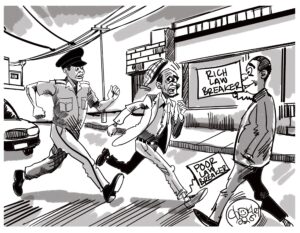Rastafari have become a common sight in Zambia, easily identified by their dreadlocks, “Rasta rainbow” colours, and their entrepreneurship as artists, musicians, and painters. While this “new religious movement” began in Jamaica in the 1930s, the roots of Rastafari are deeply embedded in Africa.
Anyone familiar with Rastas know they are peace-loving and god-fearing people. However, more than 20 years of persecution by the Drug Enforcement Commission has turned Zambia’s Rastafari population into suspects and even fugitives in their own country.
It was not always this way. In the 1980s, when Zambian Rastas first began to organize themselves, security forces were extremely tolerant of Rastafari, not least of all because cannabis was widely used and respected by freedom fighters in the struggle for our nation’s independence.
The first Rastafari gatherings, called “Nyahbingis”, featured groundbreaking roots reggae acts like Maoma (meaning “royal drums” in Lozi) and were held at the University of Zambia. Meanwhile the first Bob Marley tribute show was performed in 1984 at the Fringe Theatre Club at Findeco House.
These gatherings were organized by members of the Movement of Jah People, which became the Rastafari Foundation of Zion, and finally the House of Rastafari, which was registered as an official society in 2010.
The main centres of Rastafari have traditionally been Lusaka and Kitwe, which for many years was the driving influence for all Rastas in Zambia. The Kitwe gathering regularly featured on ZNBC radio, and even produced a documentary―in collaboration with the Catholic Church―about the Rastafari movement on the Copperbelt.
There was a natural inclination to Rasfari in Zambia, particularly because those early freedom fighters were influenced by the writings of black nationalists such as Marcus Garvey to fight against colonialism and oppression.
Once UNIP and the freedom fighters were overthrown, however, the official attitude toward Rastafari began to change. Frederick Chiluba’s “new culture” government had little use for the old, least of all freedom fighters and anyone seen to be clashing with the “new thinking” of the MMD government.
And while the Drug Enforcement Commission had been established by Kaunda to undermine the trade in Mandrax, DEC soon turned against cannabis cultivators and users. In part this was due to the influence of the US Drug Enforcement Administration. While Kaunda had attempted to limit US imperialism in Zambia, Chiluba opened the door to DEA, allowing the agency to train and fund DEC.
Before the 1990s, cannabis arrests were rare, and anyone caught with the drug was usually fined and released within a few hours of paying the fine. After 1994, however, DEC began what has today become an all-out war on cannabis cultivators and users.
Statistics are not available for how many Rastas and other Zambians have been caged for cannabis since 1994, but the figure must surely be over 100,000. In just the last 3 years alone, 17,107 Zambians have been caged by DEC, averaging 16 people every single day, most of them for cannabis.
Recently, DEC has released its first quarter results showing that the commission has caged 1431 people since January 1st, representing an average of 11 people per day, and a 7 per cent increase over last year. If DEC is allowed to continue at this pace, more than 6000 Zambians will be caged by the end of 2017.
While some Zambians may cheers DEC, few know how violent and oppressive the commission has become. From mounting aggressive roadblocks at gathering sites like Mount Zion to the savage raids on Chibolya―the poorest compound in Lusaka―DEC has exposed themselves as cruel and ruthless participants in Zambia’s own war on drugs.
Unsurprisingly, Rastafari have been high priority targets for DEC, and Rastas accuse the commission of regularly using extreme violence to harass and intimidate them. Last year, the Rastafari prayer grounds in Chipata were raided by DEC, who reportedly burned the altar, destroyed drums, and confiscated Bibles as well as personal possessions.
Also last year, a birthday celebration for late Ethiopian Emperor Haile Selassie in Ngombe was raided by a large contingent of heavily armed DEC officers, who fired their guns in the air and arrested 21 people including a juvenile who had his arm broken.
While covering the trial of these Rastafari as well as investigating reports of abuse and brutality by DEC, I have been struck by how vicious and heartless this secretive “security wing” truly is. It is obvious to the Rasta community (and this reporter) that the actions of DEC are highly unconstitutional and deeply immoral.
Besides the violence and intimidation, there is an obvious motive of extortion that one experiences when going to court on a DEC case. Rastafari regularly suffer extortionary demands for money, not to mention the confiscation of valuables by DEC officials.
I have personally heard multiple accounts of those arrested having their possessions stolen, while even high value assets like vehicles, houses, and farms are seized and never returned. Victims of last years’ Ngombe raid are still seeking the return of their property.
Many Rastas I have spoken to complain about police harassment that has become so regular that some have shaved their dreadlocks rather than face continued abuse from authorities.
On the other hand, DEC’s heavy hand has also inspired resistance. The House of Rastafari in Lusaka has written official letters of complaint to the Ministries of Justice and Home Affairs, as well as to the Human Rights Commission, Zambia Police Service, Zambia Correctional Service, and DEC itself.
Recently, the House approached the Ministry of Religious Affairs and National Guidance seeking official protection from DEC, and clarification about the use of cannabis as sacrament in religious observances (Rastafari are not alone in such use, as cannabis has been utilized for centuries in both Judaism and Hinduism).
At the same time, the House is considering a formal Constitutional challenge to the harassment and brutality faced by its members if government fails to step in and protect the community. Rastas are also beginning to formulate demands in the political arena, specifically the end to cannabis arrests, the release of all cannabis convicts, and an investigation into the benefits of cannabis, as well as an inquiry into the activities of DEC.
This year, Zambia is playing host to one of the world’s largest gatherings of Rastafari. The “International Great Nyahbingi” will take place from 23-30 July, and is expected to attract thousands of Rastas from Africa, the Caribbean, Europe, and North America.
As the House of Rastafari in Zambia prepares for this momentous event, all eyes are on government, with prayers and high expectations that, at the very least, the state will step in and make sure no foreign guests are made victims of DEC’s increasingly immoral and brutal war on cannabis.



















One Response
Because we go to wrong people! We must see the Creator of Zambia, DEC, and Black gathering (Rastafari) Himself.
Not until his people come to him and recognise him as the Lord. He will hear us and restore our land because he is still living, he is the King of kings (KK).